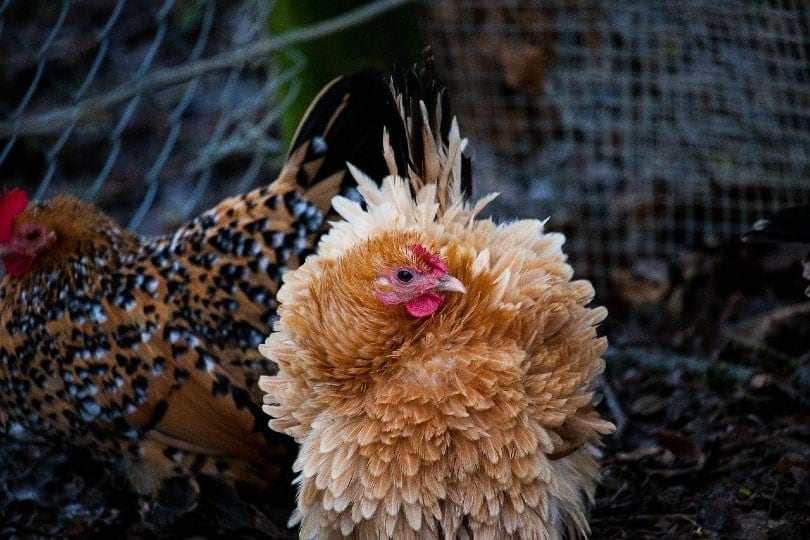The Frizzle Chicken is a unique-looking bird with curled or “frizzled” feathers. This look is caused by an incomplete dominant gene that must be present in one of the parent birds.1 Chickens that carry this gene won’t always have frizzled feathers, but they can create offspring that will.
This look makes Frizzle Chickens less of a meat-production bird and more of a show-quality bird or friendly pet.
In nine countries, the Frizzle Chicken is recognized as its own breed. The United States does not recognize this chicken as a breed, but rather as a type of plumage that can be present in any chicken breed.

Quick Facts About the Frizzle Chicken
| Breed Name: | Frizzle in nine countries; not recognized as a breed in the United States |
| Place of Origin: | Asia |
| Uses: | Eggs, exhibition, pets |
| Size: | All recognized sizes |
| Color: | All recognized colors |
| Lifespan: | 3 – 10+ years; 6 – 8 years on average |
| Climate Tolerance: | All climates |
| Care Level: | Easy |
| Temperament: | Friendly, docile, calm |
| Flying Ability: | Unable to fly |
Frizzle Chicken Origins
The origins of the Frizzle Chicken are largely unknown. In Charles Darwin’s documents, he mentions that the Frizzle Chicken is found in India. He referred to these chickens as “Caffie Fowl.” The gene responsible for the frizzled feathers is believed to have originated in Asia. The first documentation of the Frizzle Chicken was recorded by Aldrovandus in the 1600s.
As people grew curious about these birds, they were brought to Western countries and used in shows. Since this feather variant can affect all chicken breeds, the bird’s particular breed standard is used in the United States to judge a Frizzle Chicken.

Frizzle Chicken Characteristics
Frizzle Chickens are hardy birds, but their curled feathers make them more susceptible to cold and heat. The feathers don’t grow flat to the body, so temperature control for these birds is important. They need more protection than other breeds against the elements.
These chickens are friendly and good-natured. The personality and behavior of your Frizzle Chicken will depend largely on what breed the chicken is, but overall, they make excellent pets that even like to sit in laps and be held. They’re submissive and gentle, but they can become targets of bullying from other flock members. Their curled feathers are appealing for other chickens to pluck out.
Frizzle Chickens can produce up to 150 eggs per year, especially if they are provided excellent care. They make good mothers, incubating their eggs well and being attentive to their chicks.
The formation of their feathers makes the Frizzle Chickens unable to fly. While chickens aren’t known for their flying abilities, Frizzle Chickens have it even worse.
In backyard flocks, the Frizzle Chickens like to forage and roam. They tend to do well in confinement, getting along with other chickens with similar natures. They like to be outdoors, but protection from predators is required, especially since the birds can’t fly.
Uses
Frizzle Chickens can be used for meat, but this is one of the least common reasons that people keep them. In flocks, they are typically used for egg production. With their unique looks and friendly personalities, Frizzle Chickens are regularly kept as pets and show birds.
In shows in the United States, the Frizzle Chickens are shown as the breeds they are. For example, if a Cochin Chicken has the Frizzle gene, they’d still be shown and judged using the Cochin breed standards.
Appearance & Varieties
The appearance of the Frizzle Chicken will follow the look of their particular breed. Their defining characteristic is their unique curly plumage. The feathers grow away from the body instead of flat against it, giving the chicken the appearance that they just walked backward in a windstorm.
While the look of the chicken is based on each breed, it’s not advised to breed two Frizzles together. This will produce a Frazzle Chicken.
Frazzles are delicate birds. While the Frizzle Chicken is a regular bird with different plumage, a Frazzle Chicken is known as “over-Frizzled.” They have extremely curly, delicate plumage that breaks easily. This leaves them covered in bald spots. Frazzles also suffer from health problems, such as an enlarged heart. They’re susceptible to sunburn and sensitive to the cold.
Population/Distribution/Habitat
The Frizzle Chicken is considered its own breed in Belgium, France, Germany, the Czech Republic, Ireland, Poland, Italy, Slovakia, and the United Kingdom. They are adaptable to any environment and do well in flocks. However, they will need climate-controlled living spaces, especially in the winter months, to help them stay warm.
Since any breed of chicken can carry the Frizzle gene, this chicken can be found all over the world.

Are Frizzle Chickens Good for Small-Scale Farming?
Frizzle Chickens are good choices for small-scale farming. They’re easy to keep and get along well with other flock members. They are calm and docile birds that make good pets. They are also good egg producers.
These chickens need extra help staying warm in the winter and cool in the summer because their plumage doesn’t protect them well. They also need added protection against predators because they can’t fly.
If you’re interested in breeding Frizzle Chickens, remember that they can produce both curly and smooth-feathered offspring. It’s not recommended to breed two Frizzles together due to the health problems that can occur.
Frizzle Chickens are not a breed, but rather a type of chicken that occurs due to an incomplete dominant gene. This results in the chickens having curly rather than smooth feathers, giving them a disheveled appearance that is endearing to many owners. Frizzle Chickens are recognized as a breed in nine countries, but in the United States, they are identified by plumage type. These chickens are wonderful because of their unique features, sweet natures, and quality egg production.
Featured Image Credit: minka2507, Pixabay
